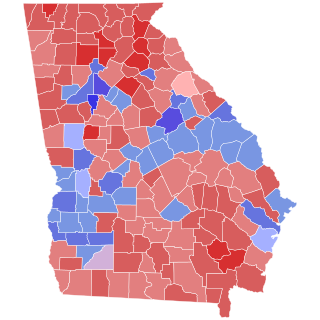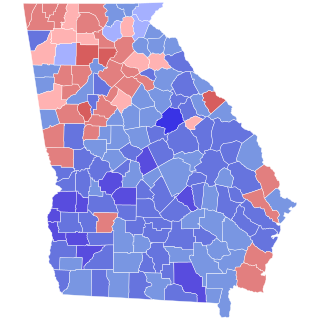
John Hardy Isakson was an American businessman and politician who served as a United States senator from Georgia from 2005 to 2019. A member of the Republican Party, he previously served in the Georgia legislature and the United States House of Representatives.

Herman Eugene Talmadge was an American politician who served as governor of Georgia in 1947 and from 1948 to 1955 and as a U.S. senator from Georgia from 1957 to 1981. A Democrat, Talmadge served during a time of political transition, both in Georgia and nationally. He began his career as a staunch segregationist known for his opposition to civil rights, including supporting legislation that would have closed public schools to prevent desegregation. By the later stages of his career, following the enactment of the Voting Rights Act, which gave substance to the Fifteenth Amendment enacted nearly one hundred years before, and increased African American voter participation, Talmadge, like many other Southern politicians of that period, had modified his views on race. His life eventually encapsulated the emergence of his native Georgia from entrenched white supremacy into a multiracial political culture where many white voters regularly elect Black and other non-white candidates to the U.S. Congress and Georgia General Assembly.

The 1980 United States Senate elections were held on November 4, 1980, coinciding with Ronald Reagan's victory in the presidential election. The 34 Senate seats of Class 3 were contested in regular elections. Reagan's large margin of victory over incumbent Jimmy Carter gave a huge boost to Republican Senate candidates, allowing them to flip 12 Democratic seats and win control of the chamber for the first time since the end of the 83rd Congress in January 1955.

The 1972 United States Senate elections were held on November 7, 1972, with the 33 seats of Class 2 contested in regular elections. They coincided with the landslide re-election of Republican President Richard Nixon. Despite Nixon's landslide victory, Democrats increased their majority by 2 seats. The Democrats picked up open seats in Kentucky and South Dakota, and defeated 4 incumbent senators: Gordon Allott of Colorado, J. Caleb Boggs of Delaware, Jack Miller of Iowa, and Margaret Chase Smith of Maine. The Republicans picked open seats up in New Mexico, North Carolina, and Oklahoma, and defeated one incumbent, William B. Spong Jr. of Virginia.

The 1968 United States Senate elections were elections for the United States Senate. Held on November 5, 1968, the 34 seats of Class 3 were contested in regular elections. They coincided with the presidential election of the same year. The Republicans picked 5 net seats up in the Senate. This saw Republicans win a Senate seat in Florida for the first time since Reconstruction.

The 1932 United States Senate elections coincided with Democrat Franklin D. Roosevelt's landslide victory over incumbent Herbert Hoover in the presidential election. The 32 seats of Class 3 were contested in regular elections, and special elections were held to fill vacancies.

The 2008 United States Senate election in Georgia took place on November 4, 2008. The runoff election took place on December 2, 2008. Republican Senator Saxby Chambliss, first elected in 2002, sought re-election to his position as a United States Senator from Georgia. He was challenged by Democratic nominee Jim Martin and Libertarian nominee Allen Buckley. After a runoff election on December 2, Chambliss was elected.

The 1980 United States Senate election in Georgia was held on November 4, 1980. Incumbent Democratic U.S. Senator and former Governor of Georgia Herman Talmadge ran for reelection to a fifth term, but lost narrowly to Mack Mattingly, Chairman of the Georgia Republican Party.

The 1998 Georgia gubernatorial election was held on November 3, 1998. Incumbent Democratic Governor Zell Miller was unable to seek re-election due to term limits, therefore creating an open seat. To replace him, State Representative Roy Barnes won the Democratic Party's nomination after a close and highly contested primary election, while businessman Guy Millner, who had run for Governor and the United States Senate in the previous four years, won the nomination of the Republican Party.

The 1978 United States Senate election in Georgia was held on November 7, 1978. Incumbent Democratic U.S. Senator Sam Nunn won re-election to a second term.

The 1950 Georgia gubernatorial election was held on November 7, 1950. Incumbent governor Herman Talmadge won the Democratic primary over Melvin Thompson on June 28 with 49.33% of the vote and 295 out of 410 county unit votes. The primary was a rematch of the 1948 special election. This would be the last gubernatorial rematch in the state until 2022.

The 1938 United States Senate election in Georgia took place on November 8, 1938. Incumbent Democratic U.S. Senator Walter F. George was re-elected to a third term in office, holding off a primary challenge from Eugene Talmadge and Lawrence Camp. At this time, Georgia was a one-party state. George's victory in the September 14 primary was tantamount to election, and he had only nominal opposition in the general election.

The 1942 United States Senate election in Georgia took place on November 3, 1942. Incumbent Democratic U.S. Senator Richard Russell Jr. was re-elected to a third term in office.

The 1936 United States Senate election in Georgia took place on November 3, 1936. Incumbent Democratic U.S. Senator Richard Russell Jr. was re-elected to a second term in office after first being elected in the 1932 United States Senate special election in Georgia.

The 1956 United States Senate election in Georgia took place on November 6, 1956. Incumbent Democratic U.S. Senator Walter F. George did not run for re-election.

The 1950 United States Senate election in Georgia took place on November 7, 1950. Incumbent Democratic U.S. Senator Walter F. George was re-elected to a sixth term in office.

The 1962 United States Senate election in Georgia took place on November 5, 1962. Incumbent Democratic U.S. Senator Herman Talmadge was re-elected to a second consecutive term in office, winning large victories in the primary and general elections.

The 1968 United States Senate election in Georgia took place on November 5, 1968. Incumbent Democratic U.S. Senator Herman Talmadge was re-elected to a third consecutive term in office, winning large victories in the primary and general elections.

The 1972 United States Senate election in Minnesota took place on November 7, 1972. Incumbent Democratic U.S. Senator Walter Mondale won re-election. Minnesota was one of fifteen states alongside Alabama, Arkansas, Colorado, Delaware, Georgia, Iowa, Louisiana, Maine, Mississippi, Montana, New Hampshire, Rhode Island, South Dakota and West Virginia that were won by Republican President Richard Nixon in 1972 that elected Democrats to the United States Senate.

The 1998 Georgia lieutenant gubernatorial election was held on November 3, 1998, to elect the lieutenant governor of Georgia, concurrently with the 1998 gubernatorial election, as well as elections to the United States Senate and elections to the United States House of Representatives and various state and local elections. Georgia is one of 21 states that elects its lieutenant governor separately from its governor.






















